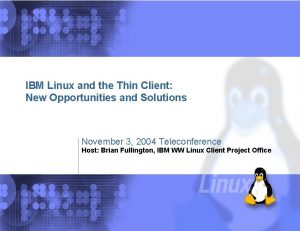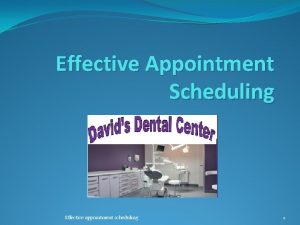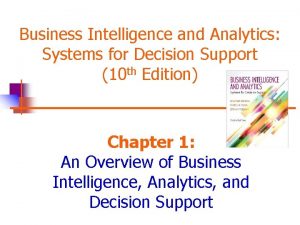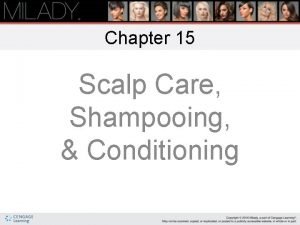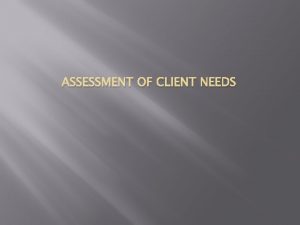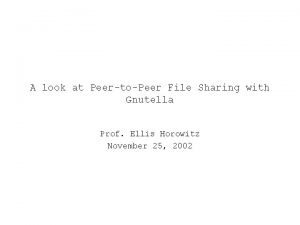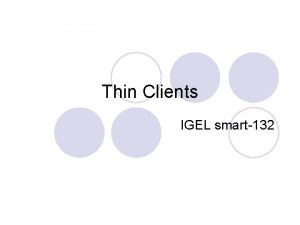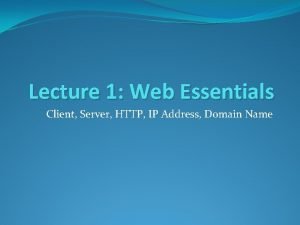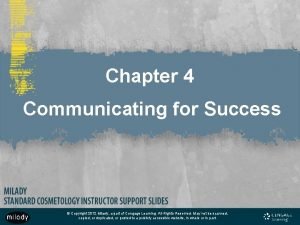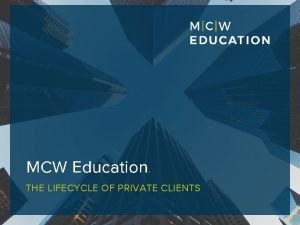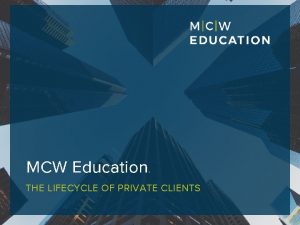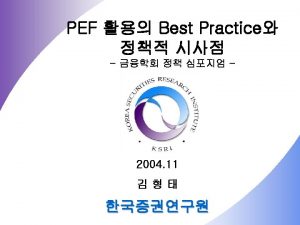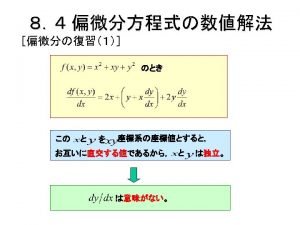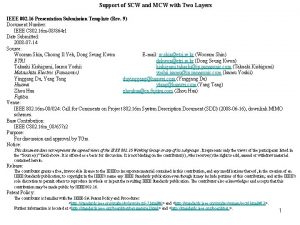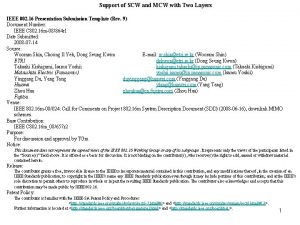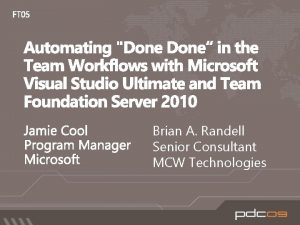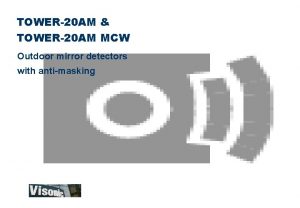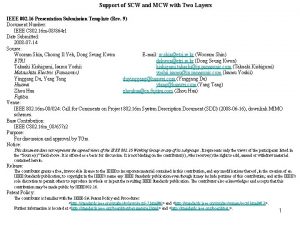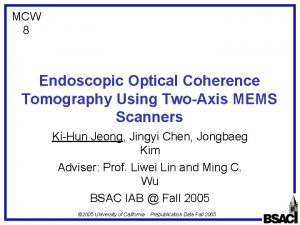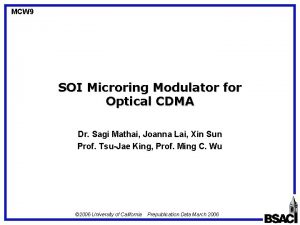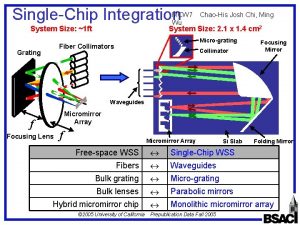MCW Education THE LIFECYCLE OF PRIVATE CLIENTS We






















- Slides: 22

MCW Education. THE LIFECYCLE OF PRIVATE CLIENTS

We will cover. • The fundaments of different structures and agreements for those structures • Structures • Areas of risk • Understanding the agreements, key provisions and management issues • Advanced estate planning involving families and structures

Management and ownership agreements. Anthea Faherty, Senior Associate, Mc. Innes Wilson Lawyers Module 2 | Lesson Three

Stakeholder Agreements – Reviewing The Fundamentals The Structure

Fundamentals • Structures – – Companies Joint ventures Co-ownership Partnership

Matters to keep in mind • • Management structure and control issues Structure and operation Decision making Managing shared objectives and individual interests and perspectives • Capital requirements • Long term growth or short term profit • Future flexibility

Areas of risk • No agreement or a properly drafted agreement • Binding new interestholders • Operation of the agreement and the limits on power contained in various governing acts • Restraint • Management decisions and interestholders obligations • Access to information and right to participate in key decisions (i. e. financial decisions) • Contributing to the entity • Issuing and transferring interests • Dispute resolution • Inconsistency with other key documents

Stakeholder Agreements – The Fundamentals Key provisions

Key provisions • • • • Initial contributions Management structure Decision making Entries and exits Limitations and restrictions Voting rights Valuation Dispute resolution and deadlock Restraint | non competition Rights of pre-emption and first right of refusal Minority versus majority rights Tag along and drag along Inconsistency clauses Quorum • • Profit distribution Financial and reporting matters Access to information Conflicts of interest Good faith | reasonable endeavours Confidentiality Termination

Questions? For more information, please contact: Anthea Faherty Senior Associate (07) 3231 0645 afaherty@mcw. com. au

Advanced estate planning for families and structures. Prue Poole − Principal & Jolynda Turner − Associate Module 2 | Lesson Four

Estate Planning. • Learning Objectives – Understand: – Testamentary discretionary trusts and Special disability trusts • Advantages and disadvantages • Main benefits of these trusts – Corporate entity succession – Superannuation interests – Common mistakes

Testamentary discretionary trusts.

Advantages. • Asset protection – Creditors – Relationship breakdown • • • Tax planning opportunities Provide for beneficiaries with special needs Flexibility control

Disadvantages. • • • Flexibility/control – not preferred by beneficiary Complexity Discretion of trustee Set up costs Ongoing costs once established

Use of TDT. • At risk beneficiaries – bankruptcy, Family Court, spendthrifts, addictions • Desire to delay benefit • Significant wealth to pass on • Tax planning opportunities • But never foolproof

Special Disability Trust. • Main financial benefits: – Gifting concessions – Assets test exemption for principal beneficiary – Taxation of trust • Characteristics: – – – – Only one principal beneficiary who meets the Eligibility Criteria Provide for their accommodation and care needs Model trust deed Independent trustee or more than one trustee Comply with investment restrictions Provide annual financial statements Conduct independent audits when required

Special Disability Trust continued. • Eligibility Criteria • Trust allowed to meet reasonable care and accommodation needs • Discretionary amount indexed annually allowed to spend on other items for primary beneficiary’s benefit • www. dss. gov. au

Corporate Entity Succession. • Need to synchronise personal and business affairs • Ensure control passes to the right hands • Inconsistency can undo the whole plan • Companies, partnerships, trusts, unitholdings

Superannuation. • Trustee has discretion to pay to any of: – Executor/Administrator of the estate; and/or – A Dependant, being: • Spouse or child • Person in an interdependency relationship • Anyone who was actually dependent on the member • Consider a BDBN as an alternative

Common Mistakes. • • Avoiding the issue Not coordinating the documentation Not consulting with interested parties Failure to fully understand mechanics of a trust

Questions? For more information, please contact: Prue Poole Jolynda Turner Principal Associate (07) 3014 6514 (07) 3231 0430 ppoole@mcw. com. au jturner@mcw. com. au
 Mcw infoscope
Mcw infoscope Today's public relations departments
Today's public relations departments Recruitment cold calling candidates script
Recruitment cold calling candidates script Principe de protection des clients
Principe de protection des clients Flux de données clients
Flux de données clients Typologie des clients insatisfaits
Typologie des clients insatisfaits Ibm thin client
Ibm thin client How to schedule appointments with clients
How to schedule appointments with clients Trauma-informed questions for clients
Trauma-informed questions for clients Social work assessment questions
Social work assessment questions Nudge for clients
Nudge for clients Existential therapy from a multicultural perspective
Existential therapy from a multicultural perspective Asme code of ethics
Asme code of ethics Bi vs dss
Bi vs dss Adlerian therapy example
Adlerian therapy example Counseling multicultural clients
Counseling multicultural clients Prospecting and qualifying
Prospecting and qualifying What are three different processes of the shampoo service
What are three different processes of the shampoo service Clients needs assessment
Clients needs assessment Gnutella clients
Gnutella clients Thin client nachteile
Thin client nachteile Web essentials
Web essentials Chapter 4 milady
Chapter 4 milady






